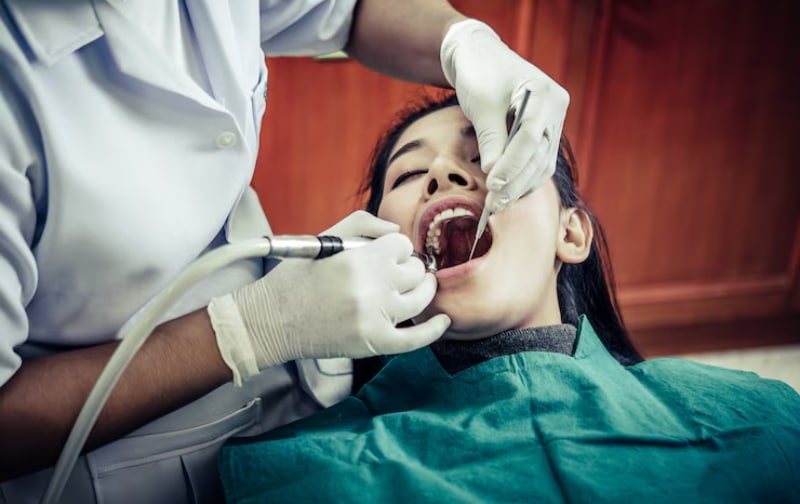Dental emergencies can happen without warning and often require immediate attention to prevent further damage and alleviate pain. Knowing when to seek emergency dentistry is crucial for protecting your oral health and potentially saving your teeth from long-term complications.
This blog explores the top five dental emergencies that should never be ignored and provides guidance on how to handle them.
1. Serious Toothache
What Is It?
- Intense, persistent pain in a tooth or surrounding area.
- Often accompanied by swelling, sensitivity to hot or cold, and sometimes fever.
Possible Causes
- Tooth decay or infection.
- Abscess formation.
- Sinus infection or gum disease.
When To See an Emergency Dentist Regarding This?
- If the pain is severe and doesn’t subside with over-the-counter pain relief.
- If there’s swelling in the face or neck, indicating a possible infection.
Immediate Steps To Take
- To lessen pain, rinse your mouth with warm salt water.
- Applying aspirin directly is not recommended for the gums since this may harm the tissue.
- Get in touch with your dentist right now to make an emergency appointment.
2. Knocked-Out Tooth
What Is It?
- A tooth completely dislodged from its socket due to trauma or injury.
Possible Causes
- Sports injuries.
- Accidents or falls.
- Physical altercations.
When To See an Emergency Dentist Regarding This?
- Within 30 minutes to an hour after the tooth has been knocked out.
- The quicker you act, the higher the chances of saving the tooth.
Immediate Steps To Take
- Refrain from contacting the tooth’s roots and handle it by its crown instead.
- If the tooth is unclean, gently rinse it with water; do not scrub or remove tissue fragments.
- Place the tooth back into its socket if possible, or keep it in a container with milk or saline solution.
- Seek emergency dental care immediately.
3. Cracked or Chipped Tooth
What Is It?
- A tooth that has been cracked or chipped, potentially exposing the inner layers of the tooth and causing pain or sensitivity.
Possible Causes
- Biting hard foods or objects.
- Trauma or accidents.
- Severe tooth decay.
When To See an Emergency Dentist Regarding This?
- If you experience significant pain, sensitivity, or if the crack is deep and affects the tooth’s functionality.
Immediate Steps To Take
- To keep your mouth clean, rinse it with warm water.
- If necessary, use a cold compress to lessen swelling, if there is any.
- Avoid chewing on the affected side and let emergency dentistry assess the damage and determine the appropriate treatment.
4. Lost or Broken Filling/Crown
What Is It?
- A loose crown or filling in the mouth that has become loose, cracked, or fallen out.
Possible Causes
- Decay or deterioration of the filling material.
- Wear and tear on the crown.
- Trauma or biting down on hard substances.
When To See an Emergency Dentist Regarding This?
- If the loss or damage leads to pain, sensitivity, or difficulty in eating.
Immediate Steps To Take
- Save the broken pieces or the filling if possible.
- Avoid using the affected tooth until you can see a dentist.
- Use dental cement or over-the-counter temporary filling material to cover the exposed area as a temporary solution.
- Book an emergency dental appointment so that you can replace or repair the filling or crown.
5. Gum Injury or Severe Bleeding
What Is It?
- Significant injury or bleeding of the gums which can result from trauma, infection, or other oral health issues.
Possible Causes
- Accidental injury or trauma.
- Periodontal disease or infection.
- Invasive dental procedures.
When To See an Emergency Dentist Regarding This?
- If the bleeding is severe, persistent, or does not stop after 10-15 minutes of applying pressure.
Immediate Steps To Take
- Apply gentle pressure with a clean cloth or gauze to control the bleeding.
- Rinse your mouth with warm salt water to keep the area clean.
- Avoid irritating the area with food or drinks until you can see a dentist.
So, understanding when to seek emergency dentistry is crucial for addressing urgent dental issues effectively. Quick intervention can save more harm and ease discomfort, whether it’s a severe toothache, a knocked-out tooth, a cracked or chipped tooth, a lost filling or crown, or a gum injury.
If you encounter any of these dental emergencies, don’t hesitate to seek assistance; always have your dentist’s contact information available. Taking immediate action can significantly affect maintaining your dental health and guaranteeing a speedy recovery.

